This Focused Meeting, jointly hosted by the Microbiology Society and the Genetics Society, and with generous support from the BBSRC, is the fifth in the international conference series "Molecular Biology of Archaea". It will take place at the London School of Hygiene and Tropical Medicine, London, UK.
It was in the 1970s and 1980s that pioneering work by Carl Woese and Wolfram Zillig uncovered the third domain of life. Archaea are prokaryotes like bacteria but in many aspects they resemble eukaryotes – recent work suggests that there are only two primary domains of life and that eukaryotes arose as a sub-group of archaea. Archaea are renowned as extremophiles and thrive in volcanic hot springs, hypersaline lakes and deep sea vents, but mesophilic archaea are increasingly being discovered and are thought to comprise >25% of microbial life in the oceans and soil.
The conference will run over three days. On the first day of the meeting there will be a BBSRC-sponsored workshop on "Genetic Manipulation of Archaea”.
The Young Researchers' Forum will take place on Monday. This will be an opportunity for PhD students and postdoctoral reearchers to present their latest work on archaea (regardless of the discipline), and the forum will run alongside the BBSRC-sponsored workshop on 'Genetic Manipulation of Archaea'.
Meeting Chairs: Thorsten Allers, Malcolm White, James Chong.
Organising Committee: Simonetta Gribaldo, David Prangishvili, Bettina Siebers, Finn Werner, Christa Schleper, Tom Santangelo, Nick Robinson, Rachel Whitaker.
Key topics:
If you have any questions please email [email protected]
Follow us on Twitter @MicrobioSoc
Updates on Molecular Biology of Archaea 5 can be found using the hashtag: #Archaea5
Image: Archaea on a rock. Thorsten Allers.
Abstract submission is now closed and reviewing is complete.
Poster abstracts for this meeting can be downloaded below. However, a printed poster abstract book will also be available to collect from the registration desk onsite. At the meeting, posters will be presented in the breakout area.
The Microbiology Society’s journal, Microbiology, is inviting submissions of research papers and reviews that explore topics surrounding archaea – from the molecular to the systems level – for a new thematic collection. Information about the collection will be available at the meeting, and Society staff will be on hand to discuss it with delegates.
For more information about the journal, please visit its website. If you would like to contact the Editorial team directly to request further information, please email [email protected].
Offered oral presentations have now been selected and these can be found in the online programme.
Presentations taking place on Monday 1 August will be held in the Manson Lecture Theatre.
Presentations taking place on Tuesday 2 August and Wednesday 3 August will take place in the John Snow Lecture Theatre.
For tips on how to best prepare a poster or oral presentation please click on the following links.
Registration is closed. Registrations will now only be accepted onsite.
Should you book for supper, you will enjoy a fantastic three-course meal at the Natural History Museum with colleagues and friends alike. Don’t miss the opportunity to network with influential professionals in your field. Registration places with supper are now fully booked, but guests can still register to attend the meeting.
The Society offers funds via the Conference Grant schemes to support the attendance of members at all stages of their careers:
The closing date for applications is Monday 6 June 2016. See the relevant pages for further details including application forms and full terms and conditions.
Book before Monday 27 June to take advantage of the early bird rate.
|
Type |
Early bird rate |
Rate after 27 June 2016 |
|
Full Member |
£150 |
£170 |
|
Full Member with supper (fully booked) |
£250 |
£270 |
|
Non-member. Affiliate Member, International Associate Member (not UK and Ireland) |
£250 |
£270 |
|
Non-member. Affiliate Member, International Associate Member (not UK and Ireland) with supper (fully booked) |
£350 |
£370 |
|
Full Concessionary Member/Student Member |
£100 |
£120 |
|
Full Concessionary Member/Student Member with supper (fully booked) |
£200 |
£220 |
|
Genetics Society member |
£150 |
£170 |
|
Genetics Society member with supper (fully booked) |
£250 |
£270 |
Upon registration you should receive an automated confirmation email. Please contact [email protected] if after 24 hours this has not been received.
If you need a letter of invitation for a visa application, we will be happy to supply this after we have received full payment.
To find out if you need a visa to visit the UK, please visit the UK visa and immigration website.
Please note that all conference delegates are responsible for their own travel and visa arrangements; the Microbiology Society will not take any responsibility for travel or visa problems.
All registration fees must be paid in full BEFORE arrival at the conference. Any outstanding registration fees must be paid before admittance will be granted to the conference.
Refunds will not be provided.
Substitutions of attendees can be made at any time by contacting [email protected].
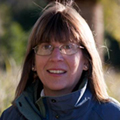 Julie Maupin-Furlow (University of Florida, USA)
Julie Maupin-Furlow (University of Florida, USA)
Julie is a Professor in the Department of Microbiology and Cell Science at the University of Florida, and is affiliated with the Genetics Institute and Florida Center for Renewable Fuels and Chemicals. The overall goals of her research program are to expand understanding of archaea to improve human health and to enhance the generation of renewable fuels and chemicals. Julie uses a multidisciplinary approach to accomplish these research goals through the combined use of proteomic, biochemical, molecular, genomic, and structural biology techniques. Her work revealed the unexpected finding that post-translational mechanisms mediated by ubiquitin-proteasome system (UPS) homologs are fundamentally conserved between archaea and eukaryotes. Julie is also a leader in discovering organic and salt tolerant biocatalysts derived from archaea that can be applied to bioindustry. Examples of these biocatalysis include inorganic pyrophosphatase for driving biosynthetic reactions and laccase for modifying phenolic compounds in lignin biomass and pyrrole-like rings such as bilirubin.
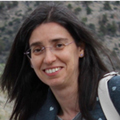 Daniela Barillà (University of York, UK)
Daniela Barillà (University of York, UK)
Daniela obtained an MSc in Biology (1991) and a PhD in Genetics (1995) from the University of Pavia, Italy, and was a visiting scientist at the University of California, Berkeley, USA (1993–94) during her PhD programme. She was then a postdoctoral associate in the Department of Biochemistry, University of Oxford (1995–98), then in the Sir William Dunn School of Pathology, University of Oxford (1998–2000), as well as in the Department of Biomolecular Sciences, UMIST, Manchester (2000–2004). From December 2004, she held a Medical Research Council New Investigator Award, first in the Faculty of Life Sciences, University of Manchester, and, from 2006, in the Department of Biology, University of York. She took up a lectureship in Prokaryotic Genetics in 2008 on completion of her MRC Award and she is presently Senior Lecturer. Daniela’s research interests have centred throughout on gene expression regulation and genome segregation explored using multi-disciplinary approaches.
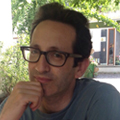 Buzz Baum (University College London, UK)
Buzz Baum (University College London, UK)
After completing an undergraduate degree in Biochemistry at Oxford, Buzz carried out his PhD work with Paul Nurse on the cell cycle in fission yeast. He then moved to Harvard Medical School to work with Norbert Perrimon on cell shape and polarity in flies. During this time, he helped to pioneer the development of cell based RNAi screening – bringing genetics to animal cell culture. Then in 2001, he established his lab at UCL. Now, his team combines these interests using a combination of approaches to study the intrinsic and extrinsic factors regulating cell shape during cell cycle progression in cancer cells, in fly epithelial and, most recently, in archaea.
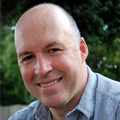 Steve Bell (Indiana University, USA)
Steve Bell (Indiana University, USA)
Steve is originally from Glasgow, Scotland. He went to Glasgow University, where he obtained his undergraduate degree in Molecular Biology, a PhD in Molecular Genetics (studying the bacterial transposon Tn7 in Dave Sherrat's lab) and then worked as a postdoc in Dave Barry's lab studying transcription in trypanosomes. In December 1995, he moved to a postdoc position in Steve Jackson's lab at the Gurdon Institute, Cambridge, where he started working on archaea. In the Jackson lab he studied basal and regulated archaeal transcription. Setting up his own lab in the MRC Cancer Cell Unit, Cambridge, Steve switched to studying archaeal DNA replication. In 2007, he moved to become the Professor of Microbiology at the University of Oxford, before relocating to Indiana University in 2012 where he has a joint appointment as a Full Professor in the Department of Molecular and Cellular Biochemistry and the Department of Biology.
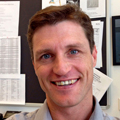 Iain Duggin (University of Technology Sydney, Australia)
Iain Duggin (University of Technology Sydney, Australia)
Iain is Senior Research Fellow at the University of Technology Sydney (UTS), Australia. He leads the Microbial Structural Dynamics research group, investigating cell growth and morphological responses to environmental signals, with a focus on the functions of nucleotide-dependent cytoskeletal proteins. During his postdoctoral research with Steve Bell (MRC-Cambridge and Oxford University, UK), he developed the “baby machine” method for cell-cycle synchronisation of archaea (Sulfolobus acidocaldarius), he experimentally linked the MCM protein with archaeal chromosome replication in vivo, and he discovered the mode of termination of chromosome replication and Xer-dif mediated chromosome segregation in archaea. Recently, he identified and defined conditions for cell differentiation in Haloferax volcanii, and developed cell biology tools for this organism, combining them with well-established molecular genetic methods to develop a model for cell biology studies. With this model, he discovered functions of archaeal tubulin/FtsZ proteins in the control of cell morphology and division, and discovered the major CetZ family of archaeal tubulin-like proteins.
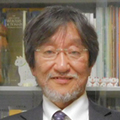 Yoshizumi Ishino (Kyushu University, Japan)
Yoshizumi Ishino (Kyushu University, Japan)
Yoshizumi graduated from the faculty of Pharmaceutical Science, Osaka University, Japan, and earned a B.S. (1981) and an M.S. (1983) with research on structure and functions on restriction endonucleases. He studied DNA ligase and the lig gene from E. coli at the Research Institute for Microbial Diseases, Osaka University, and earned his PhD (1986). He found a unique repeated sequence, which is now recognised as CRISPR, in E. coli as his first postdoc research in Osaka. He joined Prof Dieter Söll’s lab at Yale University as a postdoctoral fellow with research on translation-related enzymes (1987–1989), and came back to Takara Shuzo, Japan, as a senior research scientist in the Biotechnology Research Laboratories. In 1996, he moved to the Biomolecular Engineering Research Institute, a national project funded by the government (METI) and 18 companies, and managed a research group on nucleic acids-related enzymes. In 2002, he was appointed a Full Professor in the Department of Genetic Resources Technology (now renamed as Bioscience and Biotechnology), Kyushu University.
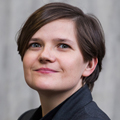 Dina Grohmann (University of Regensburg, Germany)
Dina Grohmann (University of Regensburg, Germany)
Dina studied biology in Düsseldorf and received her PhD in Physical Biochemistry in 2006, working under the supervision of Prof Tobias Restle (Max Planck Institute Dortmund). In 2007, she joined the group of Prof Finn Werner at University College London as a postdoctoral researcher followed by a position as junior research group leader at the Braunschweig University of Technology. In 2015, she was appointed Associate Professor at the University of Regensburg. Combining single-molecule biophysics, biochemistry and chemical biology, her research aims to gain a deeper understanding of molecular machineries central to biology including the transcriptional apparatus and biomolecular complexes involved in post-transcriptional regulation of gene expression with a special focus on the biology of archaea.
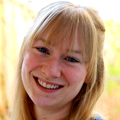 Lisa Nickel (University of Kiel, Germany)
Lisa Nickel (University of Kiel, Germany)
Lisa is a PhD student in Ruth Schmitz-Streit’s group at the University of Kiel. She studied Biology with a focus on microbiology, and graduated from the University of Kiel with a diploma degree in Microbiology in 2011. There, she worked in the field of metagenomics, identifying quorum quenching active molecules. Since 2012, Lisa has been working on her PhD thesis, studying the CRISPR-Cas system of the methanogenic archaeon Methanosarcina mazei using biochemical and genetic approaches. Her special interest lies in the Cas6 endonucleases, which are responsible for crRNA processing. With her project she is part of the DFG-funded Forschergruppe FOR1680, representing a successful German CRISPR network. She will finish and receive her PhD degree in 2016.
 Qunxin She (University of Copenhagen, Denmark)
Qunxin She (University of Copenhagen, Denmark)
Qunxin received his PhD in Molecular Biology at the University of Aarhus (Denmark) in 1993. From 1993 to 1995, he worked as a postdoctoral fellow at the Technical University of Denmark, studying archaeal DNA replication. He joined the laboratory of Prof Roger Garrett at the University of Copenhagen in 1996, studying archaeal genomics and genetic elements. He started his own laboratory in 2003, working on archaeal genetics, and obtained a tenured associate professorship in 2005. He was a founding member of the Archaea Centre at the university and has been the Director of the Centre since 2011. He also holds the position of adjunct professor at the College of Life Sciences and Technology at Huazhong Agricultural University, China, and heads the Archaeal Molecular Biology Laboratory. His current research interests include genetic studies of archaeal CRISPR defense mechanisms, DNA replication and damage repair, and archaeal genetic elements.
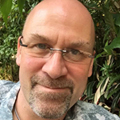 Finn Werner (University College London, UK)
Finn Werner (University College London, UK)
Finn’s laboratory at the UCL Institute for Structural and Molecular Biology follows a multidisciplinary research programme that aims at unravelling the molecular mechanisms of transcription. Transcription is a fundamental process in biology and evolutionarily ancient, and the engines of cellular transcription – RNA polymerases (RNAPs) – are closely related in all three domains of life. This applies particularly to the archaeal and eukaryotic systems, which are not only similar in terms of RNAP subunit composition and architecture, but also regarding the transcription initiation and elongation factors and molecular mechanisms that govern their activity. We have developed a recombinant transcription system from the hyperthermophilic euryarchaeon Methanocaldococcus jannaschii that is reconstituted from individual subunits. This allows us to perturb the RNAP by a molecular genetics and biophysical approaches to assess function, complex topology and dynamics by the use of molecular probes (e.g. fluorescent dyes) incorporated into RNAP subunits and transcription factors. We have applied this bespoke transcription system to illuminate the structure, function and evolution of transcription in vitro. In order to bridge the gap to the living world we have developed genetic tools to characterise in vivo phenotypes of mutants of the crenarchaeal S. solfataricus RNAP and transcription factors, and adapted systems biology approaches to (i) map the global promoter landscape and transcriptome of M. jannaschii, and to (ii) describe the whole genome occupancy of the transcription apparatus.
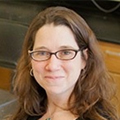 Rachel Whitaker (University of Illinois, USA)
Rachel Whitaker (University of Illinois, USA)
Rachel is an Associate Professor in the Department of Microbiology at the University of Illinois Urbana-Champaign. Her focus is on using evolutionary ecology and patterns of natural variation to understand evolutionary processes in archaea, including chromosomal recombination, gene flow, and virus–host interactions through CRISPR-immunity.
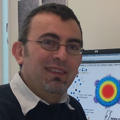 Nicola Abrescia (CIC bioGUNE, Spain)
Nicola Abrescia (CIC bioGUNE, Spain)
Nicola obtained his MSc from the Università degli Studi di Milano (Italy) in 1996. In 2001, he completed his PhD in DNA crystallography at the Universitat Politecnica de Catalunya (Spain). In May 2001, he started his postdoctoral activity at the Division of Structural Biology at the Wellcome Trust Centre for Human Genetics at University of Oxford (UK). Since 2008, Nicola has been an Ikerbasque Research Professor and Principal Investigator at the Structural Biology Unit at the CIC bioGUNE research institute in Bilbao (Spain). He studies how large multi-component proteins assemble, function and interact in the cellular context, combining state-of the-art X-ray crystallography and cryo-electron microscopy structural techniques. He has elucidated the complete archaeal transcription machinery, and his long-standing interest in the assembly principles of viruses and virus–cell recognition mechanisms has allowed him to decipher important viral processes in viruses possessing a membrane.
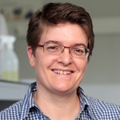 Sonja-Verena Albers (University of Freiburg, Germany)
Sonja-Verena Albers (University of Freiburg, Germany)
Sonja-Verena studied Biology at the University of Würzburg, Germany, and performed her diploma thesis work in the lab of Prof W. Zillig at the Max Planck Institute for Biochemistry (1996), Martinsried, Germany. For her PhD studies on sugar transport in Sulfolobus, she moved to the University of Groningen (1997–2001), the Netherlands. There she obtained a VENI and VIDI grant from the Dutch Science Organization to study the biogenesis of the archaeal cell envelope and then moved in 2008 to the Max Planck Institute of Terrestrial Microbiology, Marburg, Germany. After successfully establishing her group at the MPI with a focus on the assembly of cell surface appendages in crenarchaea, in 2014 she obtained a full professorship in Microbiology at the University of Freiburg, Germany.
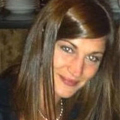 Cindy Castelle (University of California, Berkeley, USA)
Cindy Castelle (University of California, Berkeley, USA)
Microbes (Bacteria and Archaea) are critical drivers of elemental cycles throughout the planet. However, the vast majority of microbes are uncultured and we know very little about them. Cindy’s passion is exploring natural microbial communities from genomic, evolutionary, and applied perspectives. She primarily uses whole-community genomics, transcriptomics and biochemistry to understand the ecology of archaea in nature. These tools enable us to begin to understand the interplay between geochemical, evolutionary, and ecological processes through time and space.
 Nick Robinson (University of Cambridge, UK)
Nick Robinson (University of Cambridge, UK)
Nick is a Group Leader at the Department of Biochemistry at the University of Cambridge. He joined the archaeal community in 2002 as a postdoctoral researcher in Professor Stephen Bell's laboratory at the MRC Cancer Cell Unit in Cambridge. During this time, he studied the process of replication initiation in Sulfolobus salfataricus. Having established his own laboratory at the Department of Biochemistry with an MRC Career Development Award in 2009, Nick has been investigating homologous recombination driven DNA repair events concomitant with DNA replication, and also the regulation of protein homeostasis by ubiquitin-like modifiers and proteasomal degradation pathways. The Robinson laboratory uses structural, biochemical and biophysical approaches to investigate these fundamental cellular processes in thermophilic archaeal species. Nick will be moving later this year to take up a Lecturer position at the Division of Biomedical and Life Sciences at Lancester University.
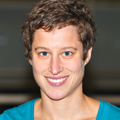 Amy Schmid (Duke University, USA)
Amy Schmid (Duke University, USA)
Amy Schmid is an Assistant Professor in the Department of Biology at Duke University. Her interest in microbial stress response began with her PhD in Molecular and Cellular Biology from University of Washington in Seattle (1998–2004), where together with her advisor, Mary Lidstrom, Amy discovered novel transcription factors regulating the heat shock response in the bacterial extremophlie, Deinococcus radiodurans. Adding systems biology approaches to her expertise during her postdoctoral work with Nitin Baliga at the Institute for Systems Biology (2004–2009), Amy characterised the transcription network regulating the oxygen response in the halophilic archaeon, Halobacterium salinarum. Since joining the faculty at Duke University in 2009, the Schmid lab has used systems biology approaches to understand transcriptional regulation of stress response across halophiles, focusing on the regulation of iron, oxidative stress, and nutrient responses.
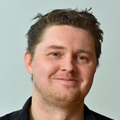 Thijs Ettema (Uppsala University, Sweden)
Thijs Ettema (Uppsala University, Sweden)
Thijs is an evolutionary microbiologist at Uppsala University, where he heads a group that focuses on the exploration of microbial diversity with next-generation genomics approaches. He received his PhD at the Department of Microbiology at Wageningen University (the Netherlands) in 2005. After a brief postdoctoral stay at the Radboud University in Nijmegen (the Netherlands), he moved to Uppsala University (Sweden) in 2006, where he currently holds an associate professorship at the Department of Cell and Molecular Biology. His group has a broad research focus and works on a variety of scientific questions connected to microbial diversity and evolution that cover all three Domains of Life, as well as viruses. One overarching theme in his research involves the origin of complex cells types (eukaryotes). Recently, he discovered the Lokiarchaeota, providing new, compelling evidence that complex cellular life evolved from an archaeal ancestor that was more advanced than was presumed before. Thijs is the recipient of the 2007 Kluyver award by the Royal Dutch Society for Microbiology, and was elected EMBO Young Investigator by the European Molecular Biology Organization in 2016.
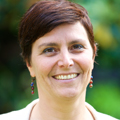 Simonetta Gribaldo (Institut Pasteur, France)
Simonetta Gribaldo (Institut Pasteur, France)
Simonetta is an Evolutionary Microbiologist. Her research interests focus on ancient evolution. By applying phylogenomics approaches, Simonetta investigates major evolutionary transitions on the Tree of Life. Her work has contributed to establishing robust reference organismal phylogenies, in particular for the Archaea, and provided a novel view on the diversity and evolutionary history of the most enigmatic of the three domains. Recently, she has proposed a novel topology for the universal tree, with an original root of the Archaea and the possibility of a methanogenic ancestor. Simonetta completed her PhD in 2001 at the Sapienza University of Rome, Italy, then moved to France for her postdoctoral studies. She obtained a permanent position in 2005 at the Institut Pasteur, Paris, where she is currently Research Director and head of the team ‘Microbial Phylogenomics’.
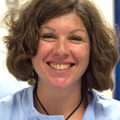 Cécile Gubry-Rangin (University of Aberdeen, UK)
Cécile Gubry-Rangin (University of Aberdeen, UK)
Cécile obtained a PhD in Microbial Ecology and Evolution from the University of Montpellier (France) in 2008, during which she investigated the maintenance of the plant–rhizobia symbiosis, demonstrating the influence of both selective advantages and the existence of partner choice mechanisms. She then joined the research group of Prof Jim Prosser at the University of Aberdeen through a postdoctoral position to work on the ecosystem function of ammonia-oxidising archaea. She demonstrated the important role of Thaumarchaeota in nitrification in acidic soils and determined the key role of pH in controlling their niche specialisation. She obtained an independent NERC fellowship in 2012 and expanded her research through analysis of evolutionary processes. She provided evidence for a unique thaumarchaeotal pattern of diversification and developed archaeal-targeted single-cell genomics to unravel the function of under-explored microbes. Her scientific discoveries have received international recognition via numerous citations of several high impact papers and several fellowship and grants.
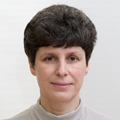 Kira Makarova (NCBI, NIH, USA)
Kira Makarova (NCBI, NIH, USA)
Kira graduated from Novosibirsk State University in 1991 and received her PhD in Genetics from the Institute of Cytology and Genetics, Novosibirsk, Russia, in 1996. She has been working in the field of Computational Biology and Comparative Genomics since 1989. Kira moved to the US in 1997, first as a Visiting Scientist in the Pathology Department at the Uniformed Services University of the Health Sciences, Bethesda, MD and then, since 2001, as a Staff Scientist at the National Center for Biotechnology Information, National Library of Medicine, National Institutes of Health, Bethesda, MD. She works there in the Computational Biology Branch in Dr Koonin’s group, focusing her research in many areas of comparative genomics and analysis of structure, function and evolution of protein families. She is a leading expert in classification and protein sequence analysis of CRISPR-Cas systems that have been recently become a dominant biotechnological tool for genome editing. Overall, Kira has contributed to over 140 scientific papers.
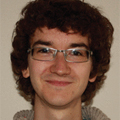 Tom Williams (Bristol University, UK)
Tom Williams (Bristol University, UK)
Tom obtained a BA in Genetics and a PhD in Molecular Evolution from Trinity College Dublin. His PhD work with Mario Fares focused on protein folding and the evolution of molecular chaperones in Bacteria and Archaea. From 2010 to 2015, he was a Marie Curie Fellow and then a Research Associate in Martin Embley's group at Newcastle University, working on phylogenetics and eukaryotic genome evolution. In October 2015, he moved to Bristol University as a Royal Society University Research Fellow.
The conference will be held at the London School of Hygiene and Tropical Medicine.
The nearest rail stations are:
The nearest underground stations are:
The following bus routes stop at Gower Street, southbound, and Tottenham Court Road, northbound:
The following bus routes stop at New Oxford Street:
The follow bus routes stop at Russell Square:
You are advised to use public transport where possible, as there is no parking available at any of the School's sites. There are parking meters and pay and display bays in nearby streets. Please be aware that the School is within the Congestion Charge zone.
Designated bicycle parking stands are available on the pavement in Keppel Street, Malet Street and on Bedford Square.
Accommodation is not included in the registration rate for this meeting. Please see below for some local options.
Hotel Russell (0.4 miles, approximately 8 minute walk)
President Hotel London (0.5 miles, approximately 10 minute walk)
Grange Holborn Hotel (0.5 miles, approximately 10 minute walk)
Holiday Inn London – Bloomsbury (0.5 miles, approximately 10 minute walk)
YHA London St Pancras (0.8 miles, approximately 15 minute walk)
London Holborn Premier Inn (0.8 miles, approximately 17 minute walk)
Goodenough Club (0.9 miles, approximately 17 minute walk)
The registration desk will be open as follows:
Monday 1 August: 08:30–17:45
Tuesday 2 August: 08:00–17:45
Wednesday 3 August: 08:00–17:30
Badges are issued by the Microbiology Society and are only to be used by the named person. For security purposes, badges must be worn at all times during the meeting.
A certificate of attendance can be requested at the registration desk or requested by email from [email protected]
This meeting is approved by the Royal Society of Biology for the purposes of CPD. Attending this event counts as 85.5 CPD credits.
Please ensure your mobile phone is switched to silent mode or off during the scientific sessions.
While every effort has been made to ensure the programme is accurate, changes are unavoidable and we will ensure updates are provided throughout the meeting online.
The Society may carry out filming and photography throughout the meeting. The images and videos will be used to promote the meeting and the activities of the Society. They may be used online, in Society publications, or for other PR and marketing purposes.
Only recording set up with prior permission is authorised.
All disclosed dietary requirements made at the point of registration have been shared with the catering team in advance. However, please ensure you ask for advice if required and the team will do their best to accommodate your needs.
Delegates, exhibitors and speakers tweeting from the conference are invited to include the hashtag #Archaea5 in their tweets. A Twitter feed will be displayed in the exhibition area. You can follow the Society on Twitter @MicrobioSoc.
The Wi-Fi onsite is free.
Please direct any questions to [email protected]
The Society operates a series of Focused Meetings that take place over one to three days. The Focused Meetings concentrate on one specific area of microbiology and incorporate presentations from leading scientists and provide opportunities for those new to the field to present their research. The meetings attract between 50 and 200 people from a specific field of microbiology, allowing organisations to meet influential researchers and scientists.
A 3x2-metre stand space located in the main exhibition area is available, which is also the location of the:
The programme book is distributed to all delegates and contains information on the meeting. Opportunities exist to purchase full colour adverts within the programme book.
Literature will be displayed in the exhibition area and on the registration desk. Sponsors will be able to display A4 or A5 literature to all delegates attending the conference.
The booking form is available to download below. Please note, confirmation will be sent from the Conferences and Events Team.
Please send the completed booking form to: [email protected]